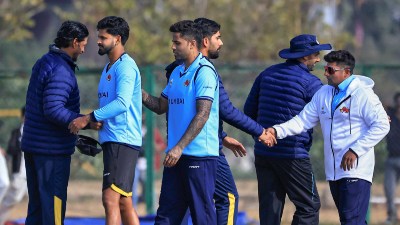No Good Guys in Richistan
How greed led to the fall of Indian-American icon Rajat Gupta
Book: The Billionaires Apprentice
Author: Anita Raghavan
Publisher: Hachette
Price: Rs 499
Pages: 512
Anita Raghavans engaging book tells the story of three South Asian men whose lust for money derailed their reputations. Galleons Raj Rajaratnam and McKinseys Rajat Gupta and Anil Kumar plunged head-first into the world of Wall Street,trading corporate secrets for vast fortunes. They lived in Richistan,the country that provided them with a false sense of immunity from basic human values. Gupta provided privileged information from his perch as a board member of Goldman Sachs to Rajaratnam,who traded it for millions,and Kumar trafficked just about any information that came before him for whatever scraps of money and power it afforded. Raghavans story is that of a fall from grace,notably that of Rajat Gupta who was once seen as the Indian equivalent of Warren Buffet. But this was always a seamy story. Guptas reputation did not come from new inventions or from public service it came from his role at McKinsey,where he oversaw policies that led to the jobless world that we now have,and then at Goldman,whose financial policies ensured that the worlds 1 per cent luxuriate at the expense of the rest.
For Raghavan the distinction between Rajaratnam and Gupta is important,and they become a central part of the narrative drive in her fast-paced book. Raghavan portrays Gupta as a man who lived a blameless life only to stumble into a web laid by Rajaratnam,whom Gupta calls a bad man. To build this narrative,Raghavan draws a sympathetic portrait of Guptas life using interviews with his family members and the letters written by them to apply to the judge for a lesser sentence. Nothing similar is allowed for Rajaratnam,whose gorilla moods and crude parties suggest that Gupta might be correct. After all,thanks to Kumars testimony,Rajaratnam was sentenced to 11 years and went to jail,while Gupta was sentenced to two years and remains free on appeal.
South Asians were on all sides of this story,as Raghavan points out. The US government officials who went after the three men included Sanjay Wadhwa of the Securities and Exchange Commission and Preet Bharara,the US Attorney for the Southern District of New York. It was their relentless work that uncovered the scams. These are some of the good guys in the story. But they are not alone. We learn that Kumar,a Doon School product,tried to hide his money by setting up a bank account in the name of his domestic servant,Manju Das,who was innocent of how her name and passport were being used. Women like Manju Das,who work hard every day and make so very little,who are taken advantage of by men like Anil Kumar,should be seen as the real heroes of our world. They work to live,while the men in this book work to defraud.
The evidence in the book suggests that little divides these men. Rajaratnam made the most money because he went into the hedge fund business,where access to wealth through illegal and legal insider trading is rampant. A recent survey shows that one in four Wall Street employees say that they have participated or would participate in some form of insider trading. The authors of this study,conducted by the law firm Labaton Sucharow,notes,Many of the young professionals who will one day assume control of the trillions of dollars that the industry manages have lost their moral compass,accepted corporate wrongdoing as a necessary evil and fear reporting misconduct. This is a ticking economic time bomb. Rajaratnams wealth was in the billions. Gupta and Kumar went into the consulting business,where they egged companies to streamline their businesses against the interests of their workers and on behalf of their bottom lines. Their wealth was in the millions. As an acquaintance of Gupta told me when news of his indictment broke,Rajat was always looking to add an extra zero to his portfolio. Greed took Gupta to Rajaratnam. There is no innocence in this story. There are no heroes amongst these men. It is worse that Guptas father was a freedom fighter,editor of Hindustan Standard,and a man who put his own needs behind that of his ideals.
Vijay Prashad is the author,most recently,
of Uncle Swami: South Asians in America Today
- 01
- 02
- 03
- 04
- 05






























